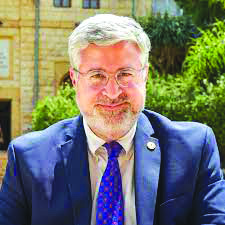 When an enormous explosion rocked central Beirut in August 2020, it wasn’t just the estate of Lebanon’s oldest university that was badly damaged. The blast — which was caused by vast amounts of ammonium nitrate dangerously stored in Beirut’s port and killed 215 people — was also a huge blow to staff morale and the already precarious finances of the American University of Beirut (AUB). Hundreds of international students cut their studies short or decided not to come altogether, says president Fadlo Khuri. “We lost about 375 students and another 600 potential students who might have accepted places,” says Prof. Khuri on the disaster that literally shook Lebanon (tremors were felt as far away as Europe).
When an enormous explosion rocked central Beirut in August 2020, it wasn’t just the estate of Lebanon’s oldest university that was badly damaged. The blast — which was caused by vast amounts of ammonium nitrate dangerously stored in Beirut’s port and killed 215 people — was also a huge blow to staff morale and the already precarious finances of the American University of Beirut (AUB). Hundreds of international students cut their studies short or decided not to come altogether, says president Fadlo Khuri. “We lost about 375 students and another 600 potential students who might have accepted places,” says Prof. Khuri on the disaster that literally shook Lebanon (tremors were felt as far away as Europe).
 “We suffered about $7.5 million (Rs.61 crore) in damage — with the windows of the new glass-fronted teaching hospital blown in,” recalls the Boston-born, Beirut-raised cancer doctor. With three of Beirut’s hospitals knocked out by the blast, the university’s medical centre proved crucial in treating some of the 6,000 people injured by flying glass and masonry. “More than 750 people visited our emergency room in the first few hours, including many of our university community,” recalls the Yale- and Columbia-educated scientist.
“We suffered about $7.5 million (Rs.61 crore) in damage — with the windows of the new glass-fronted teaching hospital blown in,” recalls the Boston-born, Beirut-raised cancer doctor. With three of Beirut’s hospitals knocked out by the blast, the university’s medical centre proved crucial in treating some of the 6,000 people injured by flying glass and masonry. “More than 750 people visited our emergency room in the first few hours, including many of our university community,” recalls the Yale- and Columbia-educated scientist.
For many staff, however, the blast proved the final straw. In the face of Lebanon’s financial collapse in 2019, AUB had already been forced to slash staff wages “to save the university”. It was then forced to cut 850 jobs in July 2020 after its revenues crashed by 60 percent in 2020-21, as students struggled to afford tuition fees. A triple whammy was completed when it lost donations and scholarships it was expecting when the pandemic hit.
Established in 1866 by Protestant missionaries, the private university became a key study destination in the Arab region, with 60 percent of its students from outside Lebanon by the mid-1970s, attracted by its US-style liberal arts teaching model. Things were tough during the civil war between 1975 and 1990 when professors and presidents were kidnapped: one president, Malcolm Kerr, an American Middle East scholar, was assassinated on campus by jihadists in 1984. But international students returned in the 1990s, and now account for 22 percent of the institution’s 8,000 students.
However, with its faculty under financial strain, ambitious universities from nearby oil-rich states have poached staff. “We’ve raided them — particularly their administrators who are very good and understand the Arab context,” a senior leader from a Gulf state institution told THE.
Lebanon needs a top-tier research university more than ever, insists Khuri. “The university has created a sense of sanity amid Lebanon’s meltdown — we need to be that anchor institution so that the country can continue to innovate, lead and thrive,” he says.
There are positive signs that the university can bounce back. “We have recruited 77 new faculty over two years and seen a significant increase in student recruitment.” Prof. Khuri is upbeat about his institution’s future. “Rankings don’t keep me awake at night — graduate employability does, but thankfully our students measure up with the best under this parameter. Even our humanists are getting snapped up.”























